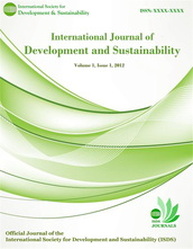|
International Journal of Development and Sustainability
Volume 1, Number 1, June 2012, Page 31-46 ISSN:2186-8662 – www.isdsnet.com/ijds A macro-econometric diagnosis of the Keynesian propositions of the money demand function in Malawi: An error-correction approach
Ken Chamuva Shawa
Abstract The institution of sound monetary policies largely depends on a good understanding of the money demand function. While there have been studies to understand the behaviour of the money demand function in general, critical analyses solely devoted to testing Keynesian propositions, particularly in developing countries, are rare. Using data from 1970 to 2005, the study employs the Augmented Dickey-Fuller (ADF) procedure to test for non-stationarity and the Johansen procedure to test for a long-run equilibrium relationship among economic fundamentals. Due to non-stationarity of variables an error-correction mechanism is used to characterise the money demand function in Malawi. Although the income elasticity of money demand bears the expected positive sign, contrary to Keynes’ contentions, the study finds a stable demand function and an inelastic interest rate elasticity of money demand. The level of financial development and exchange rates are also found significant in influencing money demand in Malawi. Vital policy implications can be drawn from the results. First, monetary policy should be undertaken bearing in mind the stability of the money demand function and the less than proportionate response of money demand to interest rate changes. Second, policies to improve the functioning of the financial sector are indispensable. Nonetheless, such policies should be supported by prudent exchange rate management to check currency substitution. Keywords: Interest elasticity; Income elasticity; Motives of holding money; Cointegration |
|


